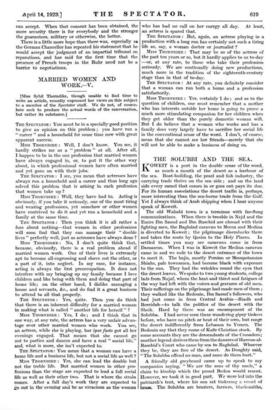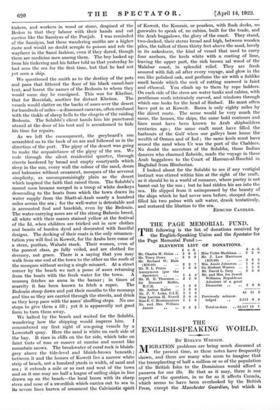THE SOLUBBI AND THE SEA.
KowErr is a port in the double sense of the word, as much a mouth of- the desert as. a- harbour of the sea. Boat-building, the pearl' and fish industry, the -carrying trade thrive on- the sea, side ; and on the land side every camel that comes in or goes out- pays. its due. Per its- human associations the desert traffic is, perhaps, more interesting than the sea-borne. trade from the Gulf. Yet I always-think of-Arab shipping when I hear anyone speak of Koweit.
The old Waha.bi town is a terminus with far4lung communications. When there is trouble in Nejd and the Emirs Ibn Saoud and Ibn-Raschid are abroad with their fighting men, the Baghdad caravan to Mecca and. Medina is diverted to- Koweit ; the pilgrimage disembarks there and takes the route by Qasint. to the. Holy- Places. In settled times you may see- caravans: come in from Damascus, When I was in Koweit the Medina -earavan came in and. we rode to. the desert entrance of the town to meet it. The hajis, mostly Persian or Mesopotamian Shiahs, pale townsmen, had become black with exposure to the sun. They had the wrinkles round the eyes that the desert leaves. We spoke to two-young students, college lads-from Najaf, whom the heat and thirst and fatigues of the way had left with the voices! and gestures of old men: Their sufferings on the pilgrimage had made meat of them ; they walked like- the Bedouin,. Ion Saoud's followers; who had just- come in from Central: Arabia—Riadh and Bortidah—to- talk the politics of the desert with the Sheik. Hard by there was an encampment of the Solubba. I had never seen these wandering gipsy tinkers before, who have no pitch or beatof their own, but range the desert indifferently from. Lebanon to Yemen. The Bedouin say that they come of Kafir Christian stock. By some accounts they are the descendants-of the Crusaders; another legend derives them from the dancers-of Haroun.al: Raschid's Court who came by sew to Baghdad. Whoever they be, they are free of the desert. As Doughty said "The Solubba offend no man, and none do them: hurt."' A friendly old greybeard- came up to speak to my companion saying; " We- are' the sons' of thy uncle," a claim to kinship which the proud Bedou would resent, However, we took it in good part. We were led into the patriarch's tent, where his son sat tinkering a vessel of brass'. - The -Solubba are braziers, farriers, blacksmiths, tinkers, and workers in wood or stone, despised of the Bedou in that they labour with their hands and eat carrion like the Sansiyas of the Punjab. I was reminded of the Sansiyas, but these wandering smiths are a higher caste and would no doubt scruple to poison and rob the wayfarer in the Sansi fashion, even if they dared, though there are medicine men among them. The boy looked up from his tinkering and his father told us that yesterday he had seen the sea for the first time, but that he had not yet seen a ship.
We questioned the smith as to the destiny of the pots and pans that littered the floor of his black camel-hair tent, and learnt the names of the Bedouin to whom they would some day be consigned. This was for Kheibar, that for Boreidah, another for distant Kheima. The vessels would clatter on the backs of asses over the desert for hundreds of miles—a dissonant caravan, often confused with the tinkle of sheep bells to the chagrin of the raiding Bedouin. The Solubbi's client hands him his punctured utensil at the door of his tent and is accustomed to bide his time for repairs.
As we left the encampment, the greybeard's son scrambled on to the back of an ass and followed us in the direction of the port. The gipsy of the desert was going to make the acquaintance of the gipsy of the sea. We rode through the silent residential quarter, through streets bordered by broad and empty courtyards which sleep in the sun, every wall the colour of the sand, doors and balconies without ornament, mosques of the severest simplicity, as uncompromisingly plain as the desert which inspired the faith that raised them. The Solubbi's _mount soon became merged in a troop of white donkeys descending to the boats from which the town draws its ,water supply from the Shatt-al-Arab nearly a hundred miles across the sea ; for the well-water is detestable and is accounted foul and brackish, even by the Bedouin. The water-carrying asses are of the strong Bahrein breed, all white with their manes stained yellow at the festival of the Id, when children are tricked out in new clothes and beasts of burden dyed and decorated with fanciful designs. The decking of their coats is the only ornamen- tation you will find in Koweit, for the Arabs here come of a stern, puritan, Wahabi stock. Their women, even of the poorest class, go fully veiled, and are clothed for decency, not grace. There is a saying that you may walk from one end of the town to the other on the roofs of the mosques without seeing a single minaret. At a street corner by the beach we met a posse of asses returning from the boats with the fresh water for the town. A mussaq fetches an anna in the bazaar ; in times of scarcity it has been known to fetch a rupee. The Bedouin stoop down and put their mouths to the mussaqs and tins as they are carried through the streets, and drink as they keep pace with the asses' shuffling steps. No one stops to give them a fill ; yet it is apparently not good form to turn them away.
We halted by the beach and waited for the Solubbi, wondering how the shipping would impress him. I remembered my first sight of sea-going vessels by a Lowestoft quay. Here the sand is white on each side of the bay. It rises in cliffs on the far side, which take on faint tints of rose or mauve at sunrise and sunset like mountain snows. The breakwater of coral rock is bluish- grey above the tide-level and bluish-brown beneath ; between it and the houses of Koweit lies a narrow white strip of beach, not a hundred yards in width, of sand and sea ; it extends a mile or so east and west of the town and on it one may see half a league of sailing ships in line drawn up on the beach—the local boom with its sharp stern and nose of a swordfish which carries out to sea in its severe lines barren of ornament the Calvinistic spirit of Koweit, the Kourais, or pearlers, with flush decks, no gunwales to speak of, no cabins, built for the trade, and the Arab buggalows, the glory of the coast. They stand, two-decked, their sterns broad and high, between wooden piles, the tallest of them thirty feet above the sand, lovely in its nakedness, the kind of vessel that used to carry four anchors, the keels white with a coating of lime, leaving the upper part, the rich brown sal wood of the Malabar coast, in splendid relief. They are fresh scoured with fish oil after every voyage, and glow in the sun like polished oak, and perfume the air with a fishlike smell beside which the reek of rotting seaweed is faint and ethereal. You climb up to them by rope ladders. On each side of the stern are water tanks and cabins, with penthouse roofs intricately carved, and windows through which one looks for the head of Sinbad. He must often have put in at Koweit. Basra is only eighty miles by the direct route. The scene would be very much the same, the houses, the ships, the same bold contours and lines must have been known to Arab shipbuilders centuries ago ; the same craft must have filled the harbours of the Gulf when our galleys bore home the wealth of Ormuz and of Ind ; the same keels must have scored the sand when Ur was the port of the Chaldees. No doubt the ancestors of the Solubba, those Indian dancers who charmed Zobeide, made the voyage in these Arab buggalows to the Court of Haroun-al-Raschid in Baghdad from Hindustan.
I looked about for the Solubbi to see if any vestigial instinct was stirred within him at the sight of the craft, as it should be in a world of romance, where poetry is not burnt out by the sun ; but he had ridden his ass into the sea. He slipped from it unimpressed by the beauty of the ships which he had- never seen before, stooped down, filled his two palms with salt water, drank tentatively, and restored the libation to the sea.
EDMUND CANDLER.











































 Previous page
Previous page